Country of Origin: United States and Canada
Dog Group: Mixed-breed dogs
Origin of Name: The name “Goldendoodle” was first used in the United States in the early 1990s, several years after Wally Conron coined the term “Labradoodle” for its Australian cousin. The Labradoodle was developed as a guide dog for vision-impaired people who themselves or whose family members suffered from dog allergies.
Shedding
A bit LowMonthly keeping cost
PremiumRs.6,000 Standard
Rs.4,000
Size
SmallBreed Info
Life span: 10 to 15 years
Availability: Easy to get
About Goldendoodle
The Goldendoodle is considered to be one of the newest of the "Doodle," or Poodle mix, breeds. Breeding began in the 1990s, after both the Cockapoo and the Labradoodle gained footholds. The theory behind the Goldendoodle's development was to create a larger Doodle that maintained the desired low-dander, low-shedding coat and that possessed the intelligent and friendly nature of the Golden Retriever.
The fact that the Goldendoodle is still a fairly young cross means that most pups are the result of first-generation breeding. That is, most are Golden Retriever and Poodle mixes; as of yet, breeding rarely occurs between pairs of Goldendoodles.
Despite the fact that the Goldendoodle has gained some popularity, especially in Australia, there is still no breed club or registry in existence. There are, however, several online communities for the Goldendoodle lover and owner. The Goldendoodle's popularity is still on the rise, and many believe that it will surpass that of other Doodle breeds.
Goldendoodles are wonderful additions to almost any home. They usually have the kind, friendly, trainable, people-oriented disposition of their Golden Retriever ancestors, blended with the natural intelligence and low-shedding coat of the Poodle.
Maintenance
Visits to Groomer-Low
Drooling-No
Bath-Rare
Tolerance to heat-Basks in it
Tolerance to cold-Loves snow
Exercise Requirement-Lots
Hair & Coat
Under Coat-No
Colour-Wheaten, Blue Brindle
Coat Type-Silky
Hair Length-Flowing
Hair Density-Dense
Health
Goldendoodles are generally healthy, but like all breeds, they're prone to certain health conditions. Not all Goldendoodles will get any or all of these diseases, but it's important to be aware of them if you're considering this breed.
Patellar Luxation
Ear Infections
Hip Dysplasia
Elbow Dysplasia
Progressive Retinal Atrophy (PRA)
Von Willebrand's Disease
Allergies
Gastric Dilatation-Volvulus
Hypothyroidism
More
Temperament
Poodles and golden retrievers are very smart, golden doodles are also very trainable. Golden Doodles are usually very affectionate with people and other pets. They are human-oriented dogs, and tend to develop a strong bond with their owners and companions. Most golden doodles are calm and quiet, but are active dogs that need exercise. Golden doodles tend to be great family pets and are known to be particularly good with children.
Training & Intelligence
Most Goldendoodles are smart and easy to train. They are eager, willing learners that respond best to positive reinforcement and gentleness. Harsh, loud corrections or training by punishment are not helpful when working with these (or most other) dogs. Socialization and training should start while the dog is still a puppy and continue throughout its life.
Breeding
Litter Size- 6 to 10 puppies (approximately)
Complication in Breeding-Yes
Procreation
The fact that the Goldendoodle is still a fairly young cross means that most pups are the result of first-generation breeding. That is, most are Golden Retriever and Poodle mixes; as of yet, breeding rarely occurs between pairs of Goldendoodles. They are healthy and sturdy breed . Generally a dog takes around 18 months to reach his or her full height and structure. It is advisable to breed your dogs after at least two years of age. If you are a first timer at breeding then taking a vets help.
 DogExpress
DogExpress


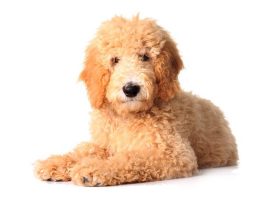
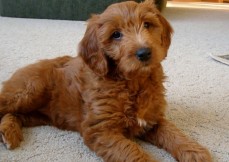
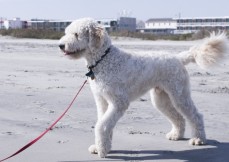
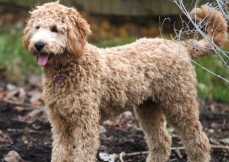
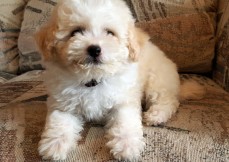












 in Chandigarh, India.
in Chandigarh, India. 

